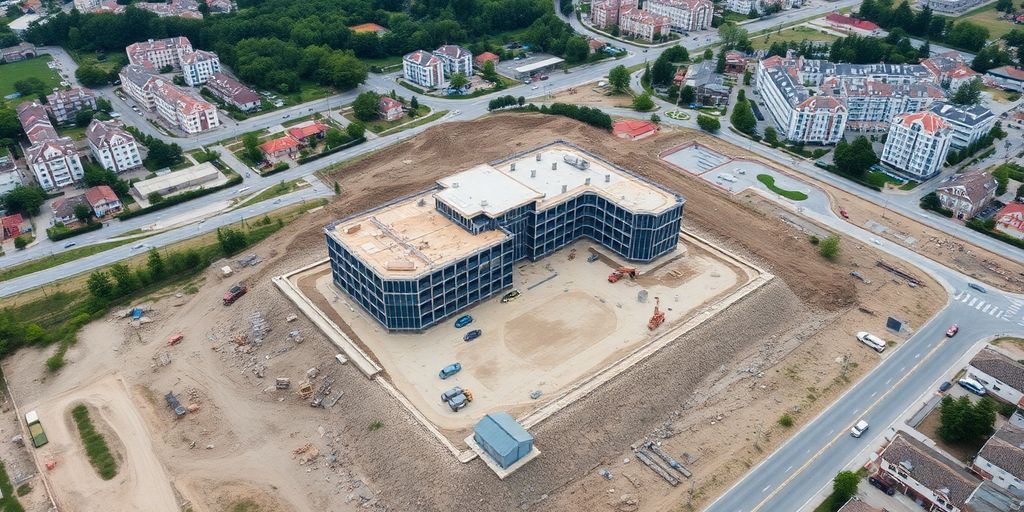Serbia is currently embroiled in a significant controversy surrounding the Trump-Kushner hotel project, which aims to transform a historic site in Belgrade into a luxury hotel. The project has faced intense backlash following revelations of forgery related to key documents that facilitated its approval.
Key Takeaways
- A former Serbian official has been detained for allegedly forging documents to expedite the Trump-Kushner hotel project.
- The site, a former Yugoslav Defense Ministry building, was heavily damaged during NATO bombings in 1999 and is considered culturally significant.
- Public protests have erupted, fueled by concerns over cultural heritage and government transparency.
Background of the Project
The proposed Trump International Hotel in Belgrade is a $500 million venture led by Jared Kushner’s firm, Affinity Partners. The site in question was once the headquarters of the Yugoslav Ministry of Defense and has remained largely untouched since the NATO bombings, which are a sensitive topic in Serbian history.
In November 2024, the Serbian government controversially stripped the site of its protected cultural status, allowing for the hotel’s development. However, this decision has come under scrutiny after Goran Vasic, the acting director of the Institute for the Protection of Cultural Monuments, admitted to forging documents that facilitated this change.
The Forgery Scandal
The scandal erupted when it was revealed that Vasic had fabricated an expert opinion to revoke the site’s cultural heritage designation. This admission has led to his arrest and raised serious questions about the legitimacy of the hotel project.
- Key Points of the Forgery:
- Vasic forged a proposal to strip the site of its protected status.
- The document bypassed necessary conservation expert input, violating legal procedures.
- The Serbian Prosecutor’s Office has charged Vasic with abuse of office and forgery.
Public Response and Protests
The revelation of the forgery has sparked widespread protests across Serbia, with citizens expressing outrage over the perceived erasure of national memory for commercial gain. Demonstrators argue that the site should be preserved as a memorial rather than developed into a luxury hotel.
- Protest Highlights:
- Protests intensified on the 26th anniversary of the NATO bombings, with citizens gathering near the site to voice their opposition.
- Activists and cultural heritage advocates are calling for the site to be officially designated as a war memorial.
- Opposition parties in Serbia are demanding greater transparency and accountability from the government regarding the project.
Political Implications
The hotel project has become a focal point for broader discussions about governance and corruption in Serbia. Critics argue that the swift approval of the project reflects a pattern of political favoritism towards foreign investors, particularly those connected to the Trump family.
- Political Reactions:
- Opposition leaders have accused the government of prioritizing elite interests over public welfare.
- Calls for an official investigation into the approval process are growing, with demands for accountability from the Serbian government.
Future of the Project
As of now, the future of the Trump-Kushner hotel project remains uncertain. Legal challenges and public opposition continue to mount, casting doubt on whether construction will proceed.
- Potential Outcomes:
- The Serbian government may be forced to reassess the project in light of the forgery scandal.
- Activists are urging international organizations to intervene, emphasizing the cultural significance of the site.
The situation in Serbia highlights the complex intersection of historical memory, commercial interests, and public sentiment, as the nation grapples with the implications of this controversial development.
Sources
- Serbia Erupts in Protest over Trump-Kushner Deal to Build Luxury Hotel on Historic NATO-Bombed Site, Travel And Tour World.
- Serbia Detains Ex-Official for Alleged Forgery for Trump Hotel, Bloomberg.com.
- Donald Trump’s $500m Belgrade hotel project hits legal trouble after Serbian official admits forgery, Times of India.
- A Forged Document Throws Kushner’s Belgrade Trump Hotel Project Into Doubt, Radio Free Europe/Radio Liberty.
- Forgery Claim Threatens Trump-Kushner Hotel in Serbia, The Real Deal.






